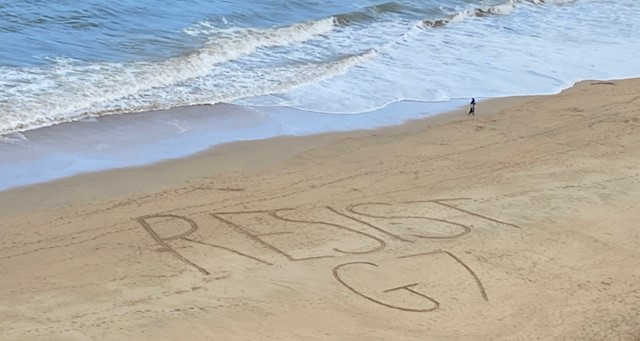Support Imprisoned Protesters
Submitted by Tony on Wed, 2023-03-22 11:47There is a long history of juries acquitting activists in criminal cases on the basis that they are acting to prevent a greater wrong. But the right for defendants to tell the truth and give the context for their actions is under threat.
In an outrageous decision, Judge Silas Reid has instructed climate protesters facing criminal charges not to refer to climate change as a motivation for their actions. When, in his defence statement, David Nixon mentioned the subject of insulation and its relation to climate change the judge jailed him for eight weeks for contempt of court.
In March 2023, despite the substantive case against them collapsing, Dorset councillor Giovanna Lewis, 65, and horticultural worker Amy Pritchard, 38, were jailed for seven weeks for contempt of court for talking about fuel poverty and climate change in court. Judge Reid told the defendants they had sought to "set themselves above the law" by mentioning aspects of their motivation in carrying out the October protest that were not relevant to jury deliberations. He concluded that the defendants had either set out to "manipulate" the jury into acquitting them even if they were sure of the pair's guilt, or to use the trial to continue their protest within the courtroom.
A number of climate activists have been held for long periods on remand, in prison ahead of being found guilty for months at a time. Louis McKechnie was one of them. The JSO activist was held for 7 months without a trial after tying himself to a goalpost at a Premier League football game and participating in other actions. the cases of many more Just Stop Oil activists can be seen here.
Keeping legal courts and judiciary separate from political decision-making is a pre-requisite of a democratic state. The human right to manage your own defence at law, and sum up your case as you see it has been enshrined in UK law but is now at an end. To prevent an explanation of intent on the basis that it may influence the jury is a political action by the court.
Climate activists, and anyone concerned for the state of democracy in Britain today should be concerned and activated by these decisions. Political censorship inside the judicial system has now effectively created political prisoners.
The Campaign against Climate Change has long called for support for climate protesters facing court action or sentenced for protesting. We are calling on all campaign groups and individuals to challenge the judgements of Silas Reid, raising the issue with MPs and human rights organisations.
The right to protest, and the very basis of democracy is under attack.
In 2021, then Home Secretary Priti Patel said: "The right to protest is a fundamental principle of our democracy but we will not tolerate guerrilla tactics that obstruct people going about their day-to-day business". Boris Johnson, Prime Minister at the time, added: "This government will always stand on the side of the law-abiding majority and ensure the toughest penalties possible for criminals who deliberately bring major roads to a standstill. We will give the police the powers they need to stop their reckless and selfish behaviour." See more here
The UK government of Prime Minister Rishi Sunak and Home Secretary Suella Braverman have expanded those pledges, now curbing the right to strike as well as identifying asylum seekers as illegal human beings who may be deported to Rwanda without being allowed to present their case for refugee status.



